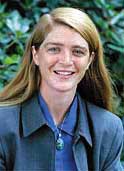|
This is an archived article.
For the latest news, go to the
Advance Homepage
For more archives, go to the Advance Archive/Search Page. | ||
|
Stopping Genocide Not A U.S. Priority, Says Speaker
While 800,000 Rwandans were systematically killed over a three-month period in 1994, U.S. policy was to avoid involvement at all costs, says an expert on human rights. There were no plans to send troops to Rwanda to restore order, and no intervention of any kind. Shockingly, the United States insisted on the complete withdrawal of U.N. peacekeepers, according to Samantha Power.
Power made her remarks March 3 in the Konover Auditorium of the Thomas J. Dodd Research Center. A lecturer in public policy and executive director of the Carr Center for Human Rights Policy at the John F. Kennedy School of Government at Harvard University, she talked about American inaction in the age of genocide. "The peacekeepers - Canadian, Belgian, Ghanaian, and Senegalese - were present and Tutsi people throughout Rwanda were sheltering under the promise of the baby-blue-and-white flag of the United Nations," Power said. The U.S. position was that if those peacekeepers got into trouble, ultimately the world would look to the U.S. to bail them out. The fear was that if you dip your toe in, your whole body gets submerged." Power recently was awarded the 2002 National Book Critics Circle prize in general nonfiction for her book A Problem from Hell: America and the Age of Genocide, which examines U.S. foreign policy toward genocide in the 20th century. Power said the Rwanda case underscored what is most notable about the United States' response to genocide. She focused her book on this country "not least because of its tremendous power and the possibility that even its mere words would have an impact on perpetrator behavior around the world, but also because of the extraordinary commitment to Holocaust awareness and lesson-learning in this country that actually make the public quite receptive to being responsive." According to Power, policy-makers avoid use of the word "genocide" for fear of facing obligations. American leaders "abstain from sending their troops unless they face significant pressure at home," she said, noting that Bosnia was a case where there was "tremendous societal noise. "Noise forces policy-makers to open the toolbox," Power said. The toolbox has a range of options: the threat of prosecution, freezing foreign assets, imposing arms embargoes, convening allies, or conducting radio jams. But in the case of Rwanda and other countries, the toolbox remains shut, she said. Power argued that despite attempts by well-meaning people who want to do something, little can be done without the approval of high-level leadership. "The red tape is too thick," she said. According to Power, American policy-makers assume that rational actors are in place who will not inflict gratuitous violence on innocent people. There is a trust in traditional diplomacy and negotiation. "There is a temptation to urge ceasefires; to see war and not genocide," she said. While researching her book, she found "striking patterns across time, place, personality, and political ideology. It's really creepy to go back and see these patterns repeat themselves, both in actual state behavior and individual behavior within bureaucracy." Often the U.S. position is that involvement will do more harm than good. "In 1988, the Reagan administration was aligned with Saddam Hussein while he was gassing his own people," Power said. Economic sanctions were not imposed against him because of the fear we would "just make him madder, he'll use more chemical weapons, he'll be even meaner to the Kurds. In fact, a year after this, our aid to his regime was doubled." According to Power, no president has ever issued a presidential directive regarding genocide. "There have been a lot of trips É to the Holocaust Museum pledging never again É," Power said, "but not the next step. Not the military contingency plan or the diplomatic contingency plan. It's not a priority." Power covered the wars in the former Yugoslavia as a reporter for U.S. News & World Report and The Economist from 1993-1996. The lecture was sponsored by Raymond and Beverly Sackler as part of the Distinguished Lecture Series. |

